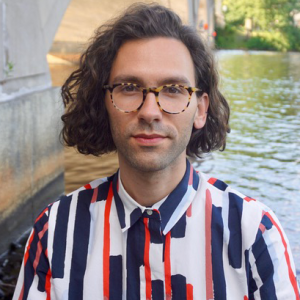In this talk, I consider the work transformismo masculino (drag king performance) is doing during a time of social and economic transformation in post-socialist Cuba. Over the past ten years, Cuba has witnessed the growth of a private economic sector dependent on tourism and the unfolding of a so-called “sexual revolution” aimed at combating homophobia and transphobia. Both of these reform movements have been criticized, however, for the lack of material gains experienced by women and Afrodescendants on the island. In response, some independent projects have emerged that draw on histories of Afrofeminist and antiracist critique in Cuba to elaborate an Afroqueer social vision for the future. I examine the performances of Havana’s transformistas masculinas (drag kings) in this context to discuss how they critique normative masculinity, create space for Black lesbian women, and promote dignity for ordinary Cubans. This work, along with the broader Afroqueer movement of which it is a part, resonates with related artist-activism throughout the hemisphere that imagines social possibilities that go beyond the well-documented alliances between neoliberalism and LGBT rights.
Matthew Leslie Santana is a violinist and ethnomusicologist broadly interested the role of performance within movements toward racial, sexual, and economic justice throughout the Americas. He is currently at work on a book about gender performance in contemporary Cuba. Drawing on long-term ethnographic fieldwork, this book examines how cultural workers on the island are using gender performance as a tool to navigate Cuba’s shifting social, political, and economic terrain since the fall of socialism. An interdisciplinary music scholar, Matthew is active in the fields of women’s, gender, and sexuality studies; performance studies; and Afro-Latin American studies. In addition to his current book project, he has conducted research on queer performance in his hometown of Miami and written about the reception of queer artists doing hip hop in New York City. Matthew’s public scholarship can be found in Cuba Counterpoints, ReVista: Harvard Review of Latin America, and Sounding Board, and he is a contributor to the forthcoming edited collection Queering the Field: Sounding Out Ethnomusicology. He is a founding member of Project Spectrum, a coalition of people of color in music studies, with whom he helped put on the 2018 symposium Diversifying Music Academia: Strengthening the Pipeline. As a violinist, Matthew focuses primarily on new music and community-based performance and education. He was a New Fromm Player at the Tanglewood Music Center in 2013 and has served on the faculty of the Sphinx Performance Academy, a tuition-free summer program for young Black and Latinx string players. Matthew completed a DMA in violin performance at the University of Michigan in 2015, and he received his PhD in ethnomusicology from Harvard University in 2019.


